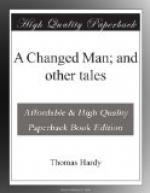Within the innermost enclosure, though it is so wide that at a superficial glance the beholder has only a sense of standing on a breezy down, the solitude is rendered yet more solitary by the knowledge that between the benighted sojourner herein and all kindred humanity are those three concentric walls of earth which no being would think of scaling on such a night as this, even were he to hear the most pathetic cries issuing hence that could be uttered by a spectre-chased soul. I reach a central mound or platform—the crown and axis of the whole structure. The view from here by day must be of almost limitless extent. On this raised floor, dais, or rostrum, harps have probably twanged more or less tuneful notes in celebration of daring, strength, or cruelty; of worship, superstition, love, birth, and death; of simple loving-kindness perhaps never. Many a time must the king or leader have directed his keen eyes hence across the open lands towards the ancient road, the Icening Way, still visible in the distance, on the watch for armed companies approaching either to succour or to attack.
I am startled by a voice pronouncing my name. Past and present have become so confusedly mingled under the associations of the spot that for a time it has escaped my memory that this mound was the place agreed on for the aforesaid appointment. I turn and behold my friend. He stands with a dark lantern in his hand and a spade and light pickaxe over his shoulder. He expresses both delight and surprise that I have come. I tell him I had set out before the bad weather began.
He, to whom neither weather, darkness, nor difficulty seems to have any relation or significance, so entirely is his soul wrapped up in his own deep intentions, asks me to take the lantern and accompany him. I take it and walk by his side. He is a man about sixty, small in figure, with grey old-fashioned whiskers cut to the shape of a pair of crumb-brushes. He is entirely in black broadcloth—or rather, at present, black and brown, for he is bespattered with mud from his heels to the crown of his low hat. He has no consciousness of this—no sense of anything but his purpose, his ardour for which causes his eyes to shine like those of a lynx, and gives his motions, all the elasticity of an athlete’s.
‘Nobody to interrupt us at this time of night!’ he chuckles with fierce enjoyment.
We retreat a little way and find a sort of angle, an elevation in the sod, a suggested squareness amid the mass of irregularities around. Here, he tells me, if anywhere, the king’s house stood. Three months of measurement and calculation have confirmed him in this conclusion.




